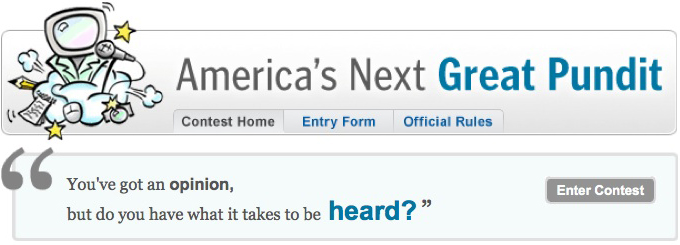
Zeba Khan is a writer and new media consultant for nonprofits. In 2009, Zeba was the first runner-up in the Washington Post’s “America’s Next Great Pundit” competition, beating out nearly 5000 other aspiring writers. Zeba has written in numerous media outlets, including the Huffington Post and the Washington Post. As a social media consultant, Zeba created the online grassroots community for The List Project to Resettle Iraqi Allies, a nonprofit that aims to help U.S.-affiliated Iraqis successfully resettle in the U.S. and has also consulted with the Ashoka Foundation to help develop their first-ever global virtual campaign to incubate young social entrepreneurs worldwide. A Fulbright Scholar, Zeba received a Master’s degree from the Fletcher School of Law and Diplomacy and a joint MA/BA from the University of Chicago.
Recently, VirtualMosque.com interviewed Zeba about her work as a journalist, as well as the role Muslim-Americans have to play in the ever-changing media.
VM: The past few months have been quite a publicity heyday for you in that your name has topped the landscape of Muslim-American journalism through the Washington Post competition. What are your reflections regarding this accession?
Zeba Khan: As a newcomer to public commentary, if my name topped the Muslim-American journalism landscape, that only points to the fact that we are heavily underrepresented in the field. There are definitely other Muslim-American writers/journalists who have been in the field much longer than I have who have made significant contributions to the field as a whole. It just so happens that I was in a contest that required a get-out-the-vote campaign, so my name received a lot of attention for a couple of months as folks pushed me forward through each round.
The contest was a great opportunity for me to explore public writing and to receive feedback from the editors of one of the nation’s top newspapers. I couldn’t have asked for a better education in op-ed writing.
VM: Your concentration on issues pertaining to the image of Islam in America is vastly admired yet a rather neglected concentration among the national population of professional journalists. How would you describe the progress of this particular field since you began journalism?
ZK: I actually wouldn’t say I have concentrated on gilding the image of Islam in America at all. My interest in writing about Islam and Muslims is the same as with any topic – I want readers to consider the entire picture, not just what the loudest voices want us to hear. With respect to Islam and Muslims, I think there is a particular need to highlight the diversity and plurality of the faith and the culture of Muslims because unfortunately most of what we read about Muslims today is very narrow in scope and stereotypically violent when that simply isn’t reflective of the 1.4 billion Muslims on the planet.
VM: How has Islam influenced your career path?
ZK: I was raised in a home that put a lot of emphasis on social justice and I think that focus was largely derived from the fact that my parents were and continue to be devout Muslims. For me, those values translated into my work with nonprofits and in civic engagement. My writing also tends to reflect my interest in social justice and how inequalities affect different communities.
VM: Research and studies show that a significantly low percentage of Muslims opt for journalism as a career choice in America (approximately 1.1%). Given the power and influence of the media coupled with this statistic, what are your thoughts?
ZK: There are some great Muslim-American writers/journalists out there like Laila Al-Arian, Wajahat Ali, Fareed Zakaria, and others – but there is always room and a need for more fresh voices. Minorities need to be part of the media in order to provide the public with a more expansive perspective. Any minority that isn’t at the table is doing a disservice to itself and to the larger public.
VM: How can Muslims from different professions aggrandize Islam in the American media?
ZK: As we both know, Muslims are a part of the fabric of this country just like any other community. However for a long time, many Muslim-Americans have been hesitant to share their religious customs and traditions with their neighbors and friends. Muslim-Americans should continue to be productive members of society like they always have but should make an effort to open up and share their culture with others. Rather than focus on the media, open your home to your neighbors for an iftar or invite neighbors over for dinner on `Eid. These seemingly small steps, if done continuously by many, would have a large impact on educating other Americans about Muslims and dismantling stereotypes and myths.
VM: What are your career ambitions for the near future?
ZK: In the near future, I intend to keep sharpening my writing and continue working as a new media consultant with non-profits and higher education institutions.

keep doing what you are doing and you will succeed i being a leadr in anything you pursue